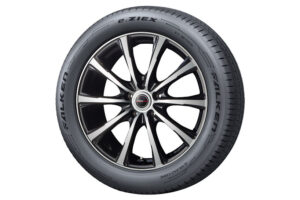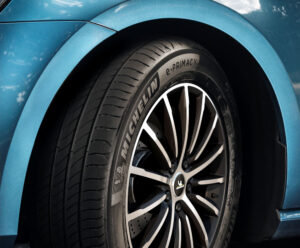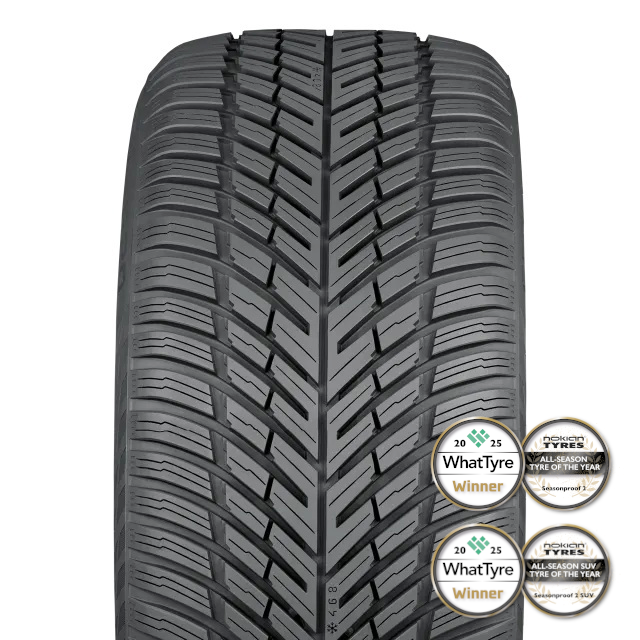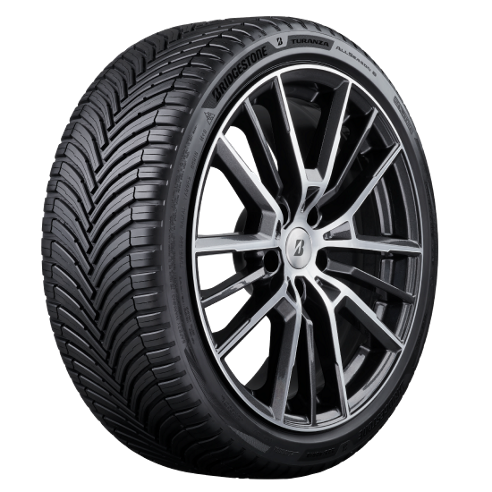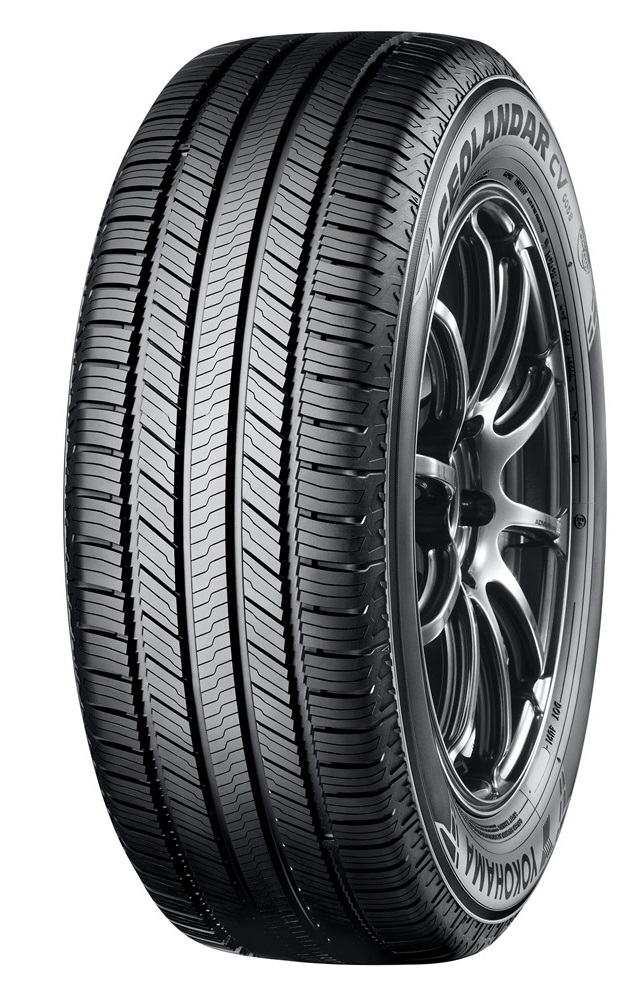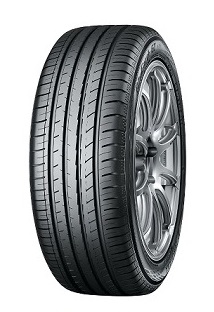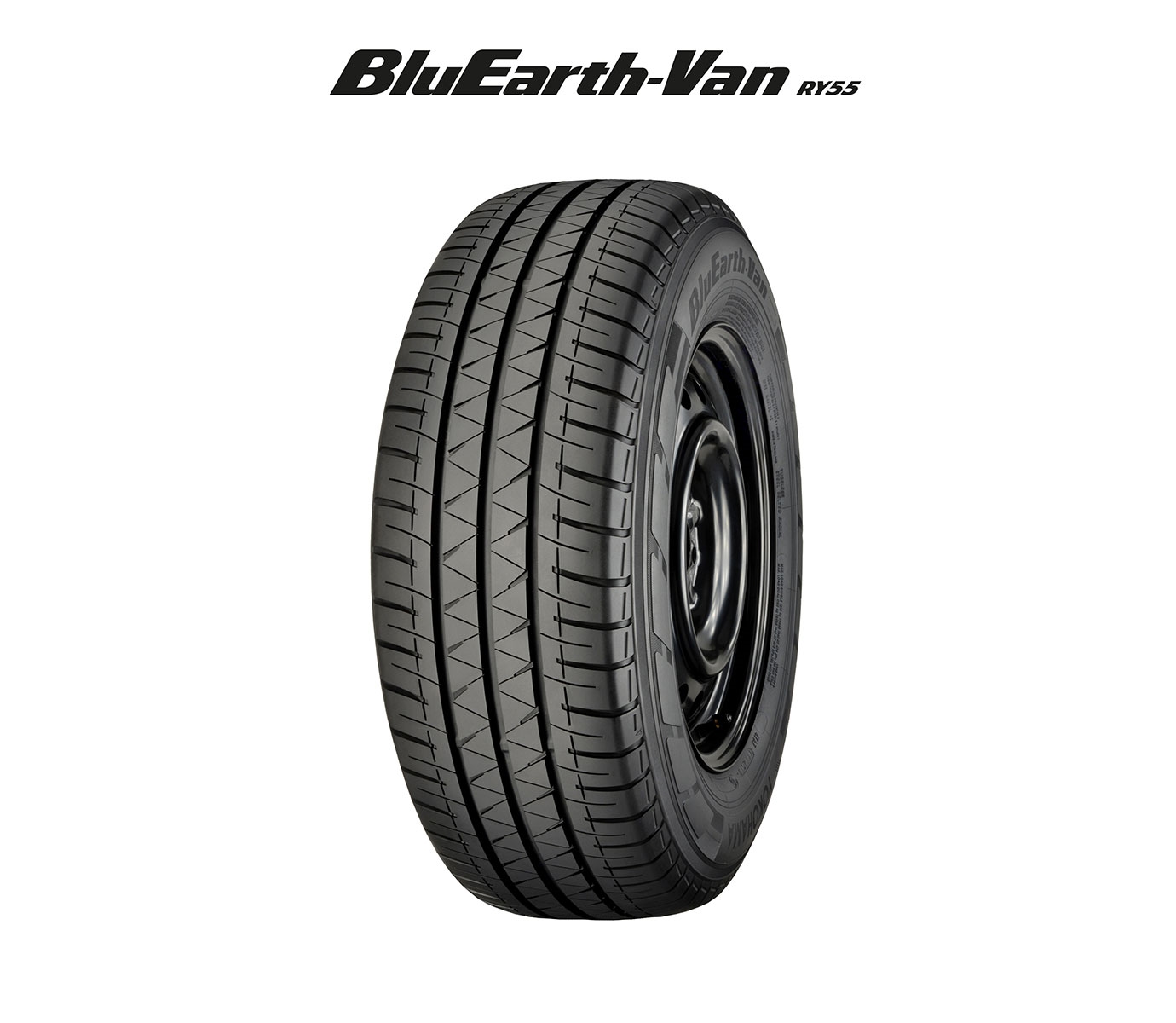We name our best specialist EV tyres in the WhatTyre Electric Car Tyre of the Year – are they better than EV-ready tyres?
The dynamism of the electric car market sees new, specialist manufacturers, especially those from China, rubbing shoulders with EV editions of familiar shapes from the world’s biggest auto brands. Electric-powered cars (EVs) are different in a few ways those with internal combustion engines (ICE) and tyre manufacturers have been altering their product strategies for the segment. Many alterations are in conjunction with the car makers, who need the product to be suitable enough for their new models to roll off production lines and into customers’ hands. The tyres originally fitted to these vehicles are altered in order to improve synergy with the vehicle – this is nothing unusual, but the difference in a characteristic such as wear rate with EVs is much more stark than normal variations between ICE vehicles. Michelin, a leading supplier of original tyres to EV models in their initial growth phase, estimates that the same tyre variant fitted to a comparable EV will wear 20% faster than the same tyre fitted to an ICE powered car.
This is a key statistic informing this year’s list of recommended electric car tyres, because the tyre market is, and will remain for some time, in a transition phase when it comes to EVs. Most tyre manufacturers now have models that they say are suitable for fitment on EVs – or “EV-Ready”. In the case of Continental, for example, this EV-readiness extends to all its current range. While Michelin warned about the reduction in tyre life motorists can expect when fitting its non-EV-tuned tyres to their Tesla, amounting to paying the same rate for four-fifths of the tyre life, it also said that there was nothing necessarily wrong with fitting its conventional tyres as long as they are the correct size and meet the load and speed ratings required. (Tyres that are “EV-ready” now feature in many categories as a consequence of this, so check out our other recommendations, such as the best eco tyres, if you would like to think about fitting non-specialist tyres to your electric car.)
Underlining the need to take care when selecting replacement tyres for EVs. road safety organisation TyreSafe advises that motorists should be more aware of the requirements an EV has for its tyres versus a standard ICE car. It said drivers of EVs should “pay close attention to the tyres they choose when the originals need replacing” because “increasingly, the tyres fitted are specifically designed for use on EVs and can be significantly different to the ‘normal’ tyres…”. Specifically, TyreSafe is warning EV owners that fitting the wrong type of tyre could result in “loss of range, extra noise, accelerated wear and the risk of failing while being driven, which could result in a serious incident.”
Should I buy specialist EV tyres for my electric car?
For this year, the Electric Car Tyre of the Year category has focused on the few products that have been tested independently on EVs, as well as those that specifically call themselves EV tyres at the range level. The category is more of an extension to the Eco Tyre of the Year category than in 2024 – this is because more tyre manufacturers than ever are applying EV-suitable technologies to their regular tyre ranges, with various sidewall markings indicating model variations that the manufacturer says are engineered for EV compatibility. With these types of tyres shortlisted across our nine categories, we have focused on the specialised products we believe are leading the way for specialist EVs. However, we also urge you to consider a wider pool of tyres, particularly referencing the Eco Tyre of the Year 2025 shortlist, when deciding how to replace your EV tyre.
It is certainly worth considering carefully how to replace your EV tyre. If you take your EV back to the dealer to replace like-for-like tyres with the homologated model, it is very likely that you may now pay an unnecessary premium to do so. While the original tyres may have been tuned to your specific vehicle, which give these models some advantages, many quality alternatives are now available in the aftermarket.
WhatTyre Electric Car Tyre of the Year 2025
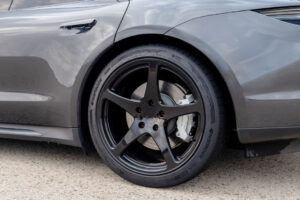
Hankook iON evo debuted as OE on the Porsche Taycan in 245/40 R21Y XL (FA) and 285/35 R21Y XL (RA) (Photo: Hankook)
Our 2024 Tyre of the Year has retained its crown as our number one recommendation for EV fitment: the Hankook iON evo.
The South Korean manufacturer has positioned itself as the leading exponent of the specialist EV tyre with its iON range. Alongside its variation for larger vehicles, the iON evo SUV, the summer tyre prevailed in its most recent test by Auto Bild. The iON evo won the 2025 test of specialist and general tyres on a Hyundai Kona, after it demonstrated good safety reserves in aquaplaning, short braking distances, excellent driving dynamics, good mileage, good comfort, and low rolling resistance.
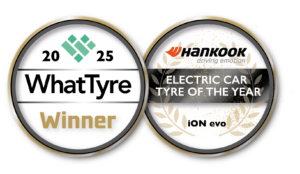 The iON evo is the centrepiece of Hankook’s growing specialist EV range. It is a summer electric vehicle tyre built from the ground up to meet the needs of battery-powered vehicles. The range also includes tyres for performance cars (iON GT), winter tyres (iON i*cept), an all-season EV tyre (iON FlexClimate) and SUV-focused variations, adding up to a fuller specialist EV range than any other manufacturer. As well as being a forerunner in specialist EV tyres, the tyre itself pushes the limits of trade-offs to reach optimum performance. The weight of the battery makes electric vehicles up to 30% heavier than ICE vehicles, which can cause uneven wear in tyres. The iON evo uses ProDurable Compound specifically made for electric vehicles to extend tyre life. Its Round Even Technology spreads out road pressure by optimising the contact structure and making tread wear more uniform. Hankook also uses Opti Pitch Technology to reduce tyre noise.
The iON evo is the centrepiece of Hankook’s growing specialist EV range. It is a summer electric vehicle tyre built from the ground up to meet the needs of battery-powered vehicles. The range also includes tyres for performance cars (iON GT), winter tyres (iON i*cept), an all-season EV tyre (iON FlexClimate) and SUV-focused variations, adding up to a fuller specialist EV range than any other manufacturer. As well as being a forerunner in specialist EV tyres, the tyre itself pushes the limits of trade-offs to reach optimum performance. The weight of the battery makes electric vehicles up to 30% heavier than ICE vehicles, which can cause uneven wear in tyres. The iON evo uses ProDurable Compound specifically made for electric vehicles to extend tyre life. Its Round Even Technology spreads out road pressure by optimising the contact structure and making tread wear more uniform. Hankook also uses Opti Pitch Technology to reduce tyre noise.
Two Highly Recommended Tyres
WhatTyre also gives its Highly Recommended rating to two other specialist EV tyres, starting with the Falken e.Ziex. The Falken e.Ziex was designed to fully respond to the distinctive needs of EVs. Manufacturer Sumitomo Rubber Industries utilises a rubber compound its developed with its proprietary Advanced 4D Nano Design material development technology in the e.Ziex. This results in simultaneous improvements in energy efficiency and grip strength.
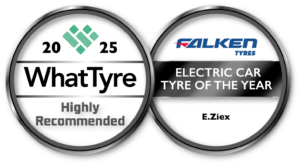 In addition, SRI also optimised the tyre profile by reducing tread width in the shoulder section, giving e.Ziex a more uniform contact pressure and thus greater load resistance. Furthermore, e.Ziex incorporates the proprietary Silent Core noise absorbing technology to provide a quieter all-around ride. The tyre has been praised for its low rolling resistance, driving dynamics on dry roads, and braking performance, winning a price-performance recommendation from tester Auto Motor und Sport in 2025.
In addition, SRI also optimised the tyre profile by reducing tread width in the shoulder section, giving e.Ziex a more uniform contact pressure and thus greater load resistance. Furthermore, e.Ziex incorporates the proprietary Silent Core noise absorbing technology to provide a quieter all-around ride. The tyre has been praised for its low rolling resistance, driving dynamics on dry roads, and braking performance, winning a price-performance recommendation from tester Auto Motor und Sport in 2025.
Meanwhile, Michelin’s e.Primacy is not only a successor to the Energy Saver; it also represents a new approach to tyre development at Michelin. In its virtual launch in late-2020 it became the first tyre to be released with an Environmental Product Declaration. The e.Primacy is rated A for energy efficiency and B for wet grip. This pairing is a result achieved by less than one per cent of all summer car tyres sold in Europe.
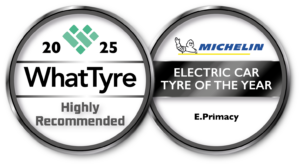 The e.Primacy has the lowest rolling resistance in its class and can save drivers around 0.21 litres of fuel per 100 kilometres, Michelin says. Electric car drivers can reckon with up to seven per cent extra range. In the ePrimacy, Michelin has revisited its Long Lasting Performance concept, or ‘performance made to last’. Based upon test results, the tyre maker is confident that even after the equivalent of 30,000 kilometres on the road, e.Primacy tyres can pass the European R117 standard wet braking approval test for new tyres. The 2025 AMS test praised the tyre for its very balanced driving dynamics and precision in dry corners, its comfort, and low noise, while also delivering high fuel efficiency.
The e.Primacy has the lowest rolling resistance in its class and can save drivers around 0.21 litres of fuel per 100 kilometres, Michelin says. Electric car drivers can reckon with up to seven per cent extra range. In the ePrimacy, Michelin has revisited its Long Lasting Performance concept, or ‘performance made to last’. Based upon test results, the tyre maker is confident that even after the equivalent of 30,000 kilometres on the road, e.Primacy tyres can pass the European R117 standard wet braking approval test for new tyres. The 2025 AMS test praised the tyre for its very balanced driving dynamics and precision in dry corners, its comfort, and low noise, while also delivering high fuel efficiency.


